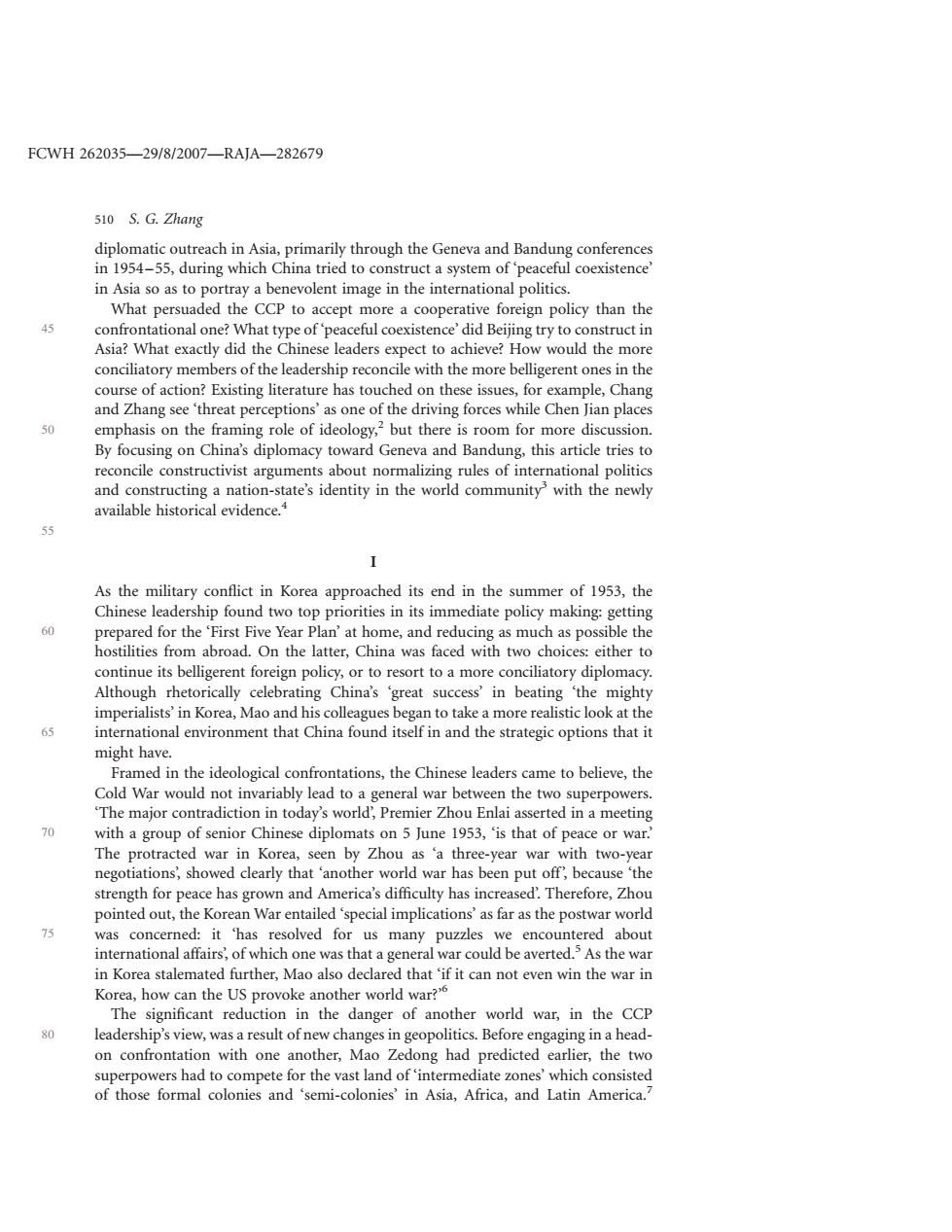正在加载图片...

FCWH262035-29/8/2007-RAJA-282679 510 S.G.Zhang diplomatic outreach in Asia,primarily through the Geneva and Bandung conferences in 1954-55,during which China tried to construct a system of 'peaceful coexistence' in Asia so as to portray a benevolent image in the international politics. What persuaded the CCP to accept more a cooperative foreign policy than the 45 confrontational one?What type of peaceful coexistence'did Beijing try to construct in Asia?What exactly did the Chinese leaders expect to achieve?How would the more conciliatory members of the leadership reconcile with the more belligerent ones in the course of action?Existing literature has touched on these issues,for example,Chang and Zhang see'threat perceptions'as one of the driving forces while Chen Jian places 50 emphasis on the framing role of ideology,2 but there is room for more discussion. By focusing on China's diplomacy toward Geneva and Bandung,this article tries to reconcile constructivist arguments about normalizing rules of international politics and constructing a nation-state's identity in the world community'with the newly available historical evidence. 55 As the military conflict in Korea approached its end in the summer of 1953,the Chinese leadership found two top priorities in its immediate policy making:getting 60 prepared for the First Five Year Plan'at home,and reducing as much as possible the hostilities from abroad.On the latter,China was faced with two choices:either to continue its belligerent foreign policy,or to resort to a more conciliatory diplomacy. Although rhetorically celebrating China's 'great success'in beating the mighty imperialists'in Korea,Mao and his colleagues began to take a more realistic look at the 65 international environment that China found itself in and the strategic options that it might have. Framed in the ideological confrontations,the Chinese leaders came to believe,the Cold War would not invariably lead to a general war between the two superpowers. The major contradiction in today's world,Premier Zhou Enlai asserted in a meeting 70 with a group of senior Chinese diplomats on 5 June 1953,'is that of peace or war.' The protracted war in Korea,seen by Zhou as 'a three-year war with two-year negotiations,showed clearly that 'another world war has been put off,because 'the strength for peace has grown and America's difficulty has increased'.Therefore,Zhou pointed out,the Korean War entailed 'special implications'as far as the postwar world 75 was concerned:it has resolved for us many puzzles we encountered about international affairs;of which one was that a general war could be averted.5 As the war in Korea stalemated further,Mao also declared that'if it can not even win the war in Korea,how can the US provoke another world war?" The significant reduction in the danger of another world war,in the CCP 80 leadership's view,was a result of new changes in geopolitics.Before engaging in a head- on confrontation with one another,Mao Zedong had predicted earlier,the two superpowers had to compete for the vast land of'intermediate zones'which consisted of those formal colonies and 'semi-colonies'in Asia,Africa,and Latin America.?diplomatic outreach in Asia, primarily through the Geneva and Bandung conferences in 1954–55, during which China tried to construct a system of ‘peaceful coexistence’ in Asia so as to portray a benevolent image in the international politics. What persuaded the CCP to accept more a cooperative foreign policy than the confrontational one? What type of ‘peaceful coexistence’ did Beijing try to construct in Asia? What exactly did the Chinese leaders expect to achieve? How would the more conciliatory members of the leadership reconcile with the more belligerent ones in the course of action? Existing literature has touched on these issues, for example, Chang and Zhang see ‘threat perceptions’ as one of the driving forces while Chen Jian places emphasis on the framing role of ideology,2 but there is room for more discussion. By focusing on China’s diplomacy toward Geneva and Bandung, this article tries to reconcile constructivist arguments about normalizing rules of international politics and constructing a nation-state’s identity in the world community3 with the newly available historical evidence.4 I As the military conflict in Korea approached its end in the summer of 1953, the Chinese leadership found two top priorities in its immediate policy making: getting prepared for the ‘First Five Year Plan’ at home, and reducing as much as possible the hostilities from abroad. On the latter, China was faced with two choices: either to continue its belligerent foreign policy, or to resort to a more conciliatory diplomacy. Although rhetorically celebrating China’s ‘great success’ in beating ‘the mighty imperialists’ in Korea, Mao and his colleagues began to take a more realistic look at the international environment that China found itself in and the strategic options that it might have. Framed in the ideological confrontations, the Chinese leaders came to believe, the Cold War would not invariably lead to a general war between the two superpowers. ‘The major contradiction in today’s world’, Premier Zhou Enlai asserted in a meeting with a group of senior Chinese diplomats on 5 June 1953, ‘is that of peace or war.’ The protracted war in Korea, seen by Zhou as ‘a three-year war with two-year negotiations’, showed clearly that ‘another world war has been put off’, because ‘the strength for peace has grown and America’s difficulty has increased’. Therefore, Zhou pointed out, the Korean War entailed ‘special implications’ as far as the postwar world was concerned: it ‘has resolved for us many puzzles we encountered about international affairs’, of which one was that a general war could be averted.5 As the war in Korea stalemated further, Mao also declared that ‘if it can not even win the war in Korea, how can the US provoke another world war?’6 The significant reduction in the danger of another world war, in the CCP leadership’s view, was a result of new changes in geopolitics. Before engaging in a headon confrontation with one another, Mao Zedong had predicted earlier, the two superpowers had to compete for the vast land of ‘intermediate zones’ which consisted of those formal colonies and ‘semi-colonies’ in Asia, Africa, and Latin America.7 FCWH 262035—29/8/2007—RAJA—282679 510 S. G. Zhang 45 50 55 60 65 70 75 80